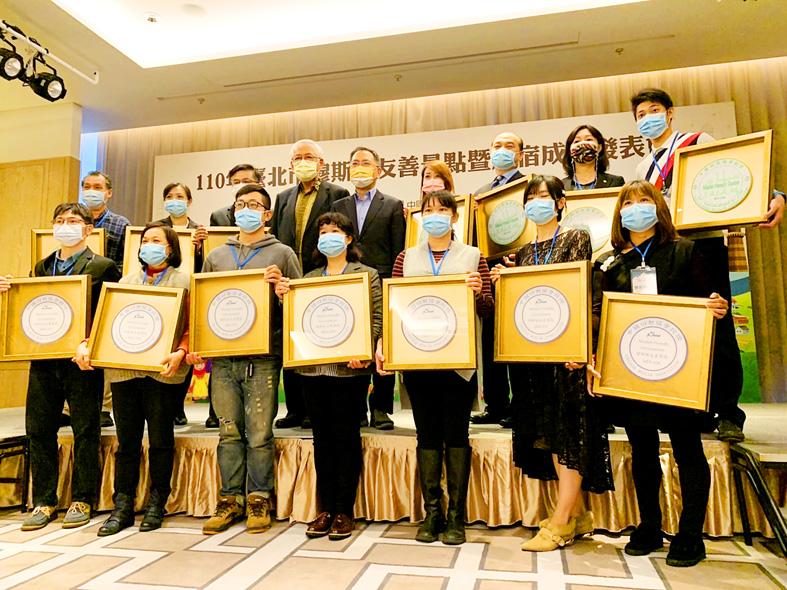Taipei needs to continue to promote itself as a Muslim-friendly city so that it can be ready to welcome Muslim visitors when international tourism resumes, Taipei Deputy Mayor Tsai Ping-kun (蔡炳坤) told a news conference yesterday.
“Once our borders open for tourists, we need to have sufficient facilities for Muslim tourists,” Tsai said. “Even though we do not have many Muslim friends here at the moment, we are committed to building a foundation.”
If efforts to develop a Muslim-friendly city stop because of the COVID-19 pandemic, Taipei would not be ready when borders open for tourism, he said, adding that he understands the pandemic has heavily affected the tourism industry.

Photo courtesy of the Taipei City Government Department of Information and Tourism
Despite the lack of tourists, efforts have not gone to waste, he said.
Taiwan this year was ranked the second most attractive nation among those that are not Organization of Islamic Cooperation (OIC) destinations for Muslim travelers as listed by the Global Muslim Travel Index, Tsai said.
The index, which was released in July, showed Taiwan and the UK tied for second among the top non-OIC destinations for Muslims, with a score of 57, trailing Singapore’s 69.
“We want to compete with Singapore for the No. 1 spot, especially as almost every visitor to Taiwan visits the capital,” Tsai said.
Taipei has been working with the Chinese Muslim Association for the past three years on the accreditation of Muslim-friendly places or tourist sites, he said.
Forty-nine hotels in Taipei have been certified, as have 16 sights in the city, he said.
“Taipei Mayor Ko Wen-je (柯文哲) hopes to make Taipei the world’s most Muslim-friendly tourist spot, and we are approaching that goal step by step,” Tsai said.
Separately, Chinese Muslim Association vice president Salahuding Ma (馬超彥) told reporters that he has noticed the efforts of Taipei to make itself Muslim-friendly, commending Taiwan’s friendly environment for making it possible.
“Taiwan is a very safe, very friendly and convenient place,” Ma said.
Ma said that a Muslim told him that while traveling in Taiwan, he was allowed to pray in convenience stores, which was not possible in some Western countries.
“Taiwan touches hearts, which visitors tell others when they return home,” Ma said.
The association provides advice and evaluates premises, such as making sure hotels signify the kiblah — the direction of Kaaba in Mecca, Saudi Arabia, toward which Muslims pray — in prayer rooms and that alcoholic beverages are not provided in minibars.
Novi Irmania, a 31-year-old Indonesian doctoral student who has lived in Taiwan for seven years, said that Taipei is her second home, because it has many Muslim-friendly facilities.
“In many of the prayer rooms, they have kiblah for Muslims and also provide prayer mats, schedules and other items,” she said. “It is really touching.”
Malaysian Mohamad bin Mos, who has lived in Taiwan for five years and has cycled around Taiwan twice, said he is impressed with Taipei’s efforts to become a Muslim-friendly city.
It is convenient and safe to find a place to pray, while halal food is plentiful in Taipei, he said. “It is very safe, you can perform your prayers and rituals without any difficulties.”

Taiwan is stepping up plans to create self-sufficient supply chains for combat drones and increase foreign orders from the US to counter China’s numerical superiority, a defense official said on Saturday. Commenting on condition of anonymity, the official said the nation’s armed forces are in agreement with US Admiral Samuel Paparo’s assessment that Taiwan’s military must be prepared to turn the nation’s waters into a “hellscape” for the Chinese People’s Liberation Army (PLA). Paparo, the commander of the US Indo-Pacific Command, reiterated the concept during a Congressional hearing in Washington on Wednesday. He first coined the term in a security conference last

Prosecutors today declined to say who was questioned regarding alleged forgery on petitions to recall Democratic Progressive Party (DPP) legislators, after Chinese-language media earlier reported that members of the Chinese Nationalist Party (KMT) Youth League were brought in for questioning. The Ministry of Justice Investigation Bureau confirmed that two people had been questioned, but did not disclose any further information about the ongoing investigation. KMT Youth League members Lee Hsiao-liang (李孝亮) and Liu Szu-yin (劉思吟) — who are leading the effort to recall DPP caucus chief executive Rosalia Wu (吳思瑤) and Legislator Wu Pei-yi (吳沛憶) — both posted on Facebook saying: “I

The Ministry of Economic Affairs has fined Taobao NT$1.2 million (US$36,912) for advertisements that exceed its approved business scope, requiring the Chinese e-commerce platform to make corrections in the first half of this year or its license may be revoked. Lawmakers have called for stricter enforcement of Chinese e-commerce platforms and measures to prevent China from laundering its goods through Taiwan in response to US President Donald Trump’s heavy tariffs on China. The Legislative Yuan’s Finance Committee met today to discuss policies to prevent China from dumping goods in Taiwan, inviting government agencies to report. Democratic Progressive Party Legislator Kuo Kuo-wen (郭國文) said

Sung Chien-liang (宋建樑), who led efforts to recall Democratic Progressive Party (DPP) Legislator Lee Kun-cheng (李坤城), was released on bail of NT$80,000 today amid outcry over his decision to wear a Nazi armband to questioning the night before. Sung arrived at the New Taipei District Prosecutors’ Office for questioning in a recall petition forgery case last night wearing a red armband bearing a swastika, carrying a copy of Adolf Hitler’s Mein Kampf and giving a Nazi salute. Sung left the building at 1:15am without the armband and covering the book with his coat. Lee said today that this is a serious